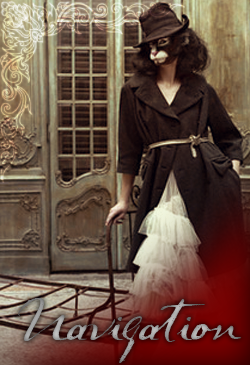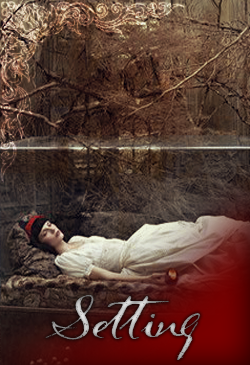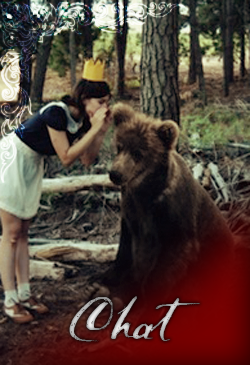Post by ELISE MONET on Aug 16, 2012 22:13:29 GMT -5
...Elise Lynette Monet*
* who are you,little i
(five or six years old)
peering from some high
window;at the gold
of November sunset
(and feeling:that if day
has to become night
this is a beautiful way) *
[/size]* who are you,little i
(five or six years old)
peering from some high
window;at the gold
of November sunset
(and feeling:that if day
has to become night
this is a beautiful way) *


...basics*
name Elise Lynette Monet
nickname Elise
age Eighteen, but people tell her she looks young
gender Female
grade N/A
hometown Menands, New York
sexuality Pansexual
personification Grim Reaper
status Awake
face claim Saoirse Ronan
...appearance*
hair color
Blonde. The sort that can look dirty in the darkness or white in the moonlight or red in the sunset.
eye color
Bathwater blue
build
Slight and almost boyish. There’s an odd, almost unearthly femininity to her face that pulls it all together somehow.
height 5’ 6”
clothing style
Simple. Blouses, tights, skirts, jeans, necklaces. There’s a classic feel to her clothes, though she can occasionally have a hard time matching. It’s not up high on her list of priorities.
distinctive traits
Her eyes are a tad eerie, almost in an elfin sort of way. She has a low voice, the kind that’s soft as well as a bit deep, soft of bordering somewhere between sexual and childish. It’s not creepy so much as delicately unsettling.
...personal*
personality
Brown penny wishes are the best kind of wishes. If you think about them enough, about the oldness of their once-newness and the kindness of their soft, worn skins you get to know them. You wonder how many people wished the same thing, how many granddaughters flipped their coins into the same fountain as you—the same coin you used—and closed their eyes and licked their lips for something, please, tomorrow. And you wonder how many wishes came true. How many times the penny got scooped up by an old man’s paper hand, and how many times its brassy neatness blinded some poor young boy playing hopscotch on the street and how often those poor young boys fell and scraped their knees and scabbed their palms reaching for wishes too girlish to toss into wells. And you think maybe there’s no such thing as girlish or boyish or anything-ish just so long as it’s shiny and worn or mossy and new and it smells like the way your mothers lotion used to taste when you licked cookie dough off the spatula in the kitchen every other Sunday at a quarter past three.
And you wonder sometimes whether penny-loafer days or twenty cent movies every really happened because they seem impossible and you’ve never seen a movie but you’ve read about them, so you suppose they must be true. And then so are princes and dragons. And maybe the occasional princess too, but it’s more likely they’re just foolish people wandering around kissing frogs for a taste of soapy, sappy, salty swampy sunshine.
You believe what people tell you when they write it down because it’s real then, in words, and you can read chicken scratch better than rosebud lips anyway, especially if the letters are chapped and cracked and bleeding raw from overuse and lots of licking and absolutely no chapstick. You keep some, though. In your back right pocket at all times. Sometimes it pokes you when you sit but it reminds you that you’re here. Solid, and if Burt’s Bees can leave a little red round imprint on your bum then maybe someone else could too, in the shape of a heart or a frown or a kiss. Only not there. And they wouldn’t, anyway, because you’re so odd.
You’ve never been kissed. Your mother used to, on your forehead just between your eyebrows back when you were five but that was before she left, drifted away on the choking back of a peapod you couldn’t get out of her throat and you watched. Shock, they called it, Why didn’t you call 911? You don’t know numbers. Only words and stories and colors and that little jolt of panic followed by relief when you’re touched by surprise but it’s only your back, thank god, and maybe being out of the house isn’t so bad after all. Stupid is a stupid word and it doesn’t mean a thing. You’re not dumb, you’re different and it’s not your fault anyway. But then whose is it?
Chocolate doesn’t taste half as good once the sun goes down because it doesn’t melt then and nothing tastes like ambrosia if you can make it last. Immortality, you say, is for the dead. You are the dead but then not quite—floating somewhere with your feet one the ground you watch, and you blink your eyes and you speak your words and people understand you but all you ever ask our questions and why, why aren’t their answers ever good enough? You tell me. Dead men tell more tales, but no one knows how to listen. Not even you because you bring them other places but you don’t keep them there. You are a shepherd, not a gatekeeper, and you never want to be. Hospitals are your hiding place, but never the morgue. Too permanent. Too unkind and too still and too stiff and too open and too clean. Dust is what you like best. The imperfection of a worn down library’s bookworm walls and mousetrap chess sets could fill your lungs for ages. You breathe in the oldness of things. The wornness, the newness of the rediscovered dead.
It’s not the death that fascinates you. It’s the dying. It’s the way people sing their songs and tell their stories and write their poems that grabs you by the gut and knots up in your chest with a wonderstruck something called courage—or maybe curiosity—and wraps a rope round your wrists so tight it cuts even though you don’t try to pull away. You don’t need to. You’re anochored there by a chain you fashioned long ago, the first time you ever read the word “end” for yourself and wondered what the hell it meant. End? The. Final. Finite. A lost cause of clipped wings and teathred ankles. You tied the knots yourself but since you didn’t follow instructions—it came with those?—you’ve forgotten how to loosen it and so instead it winds, winds, winds, winds round your calf and up your hip and to your chest and cinches a bow over your heart marking this. This is the place where roots settle and Death speaks to you in the voice of the grandmother you never met through the face of the little boy who would have been your husband if he hadn’t tried to fetch his basketball from the street and gotten hit by a car instead with the eyes of the woman who would have been your would-be-best-friend’s great aunt if only she hadn’t drowned when the Titanic sank and if only you had been born another place with another name and another mother and another something.
You can’t choose where you’re born. Only where you die.
past
She sits in the yellow, hollowed-out bedroom with its gutted furniture and too-worn curtains and she cries. They are the ugly, snot-ridden kind of tears, the ones wracked with a sort of back-bending pain that makes the only other woman in the room feel uneasy, like she shares the space with a beast, something clawing, raking at the insides of this woman—no, girl—as she screams and refuses, under any circumstances, to take the medicine her not-friend dressed in sterility is offering. She doesn’t want her stomach to burst and she doesn’t want something, anything at all to come crawling out from between her legs but she figures if it has to, it might as well be filled with pain. Maybe then it will just take her place. Steal her breath.
She, Amber Monet, doesn’t want the child that worms its way out of her womb but the wails get to her and she, panting and sweating and coated in a thing called memory, reaches for the child of the man who broke into her house and took her everything and she cries a little more, seeing the little girl has her stranger’s blonde hair. But she loves her despite herself. Elise, she says. That’s her name. Elise Lynette. The midwife nods and leaves and forgets about the girl and her mother, too scared to leave the house, because it’s easier to imagine nameless, faceless children living happy loving lives.
The clock ticks ticks ticks ticks and tok tok toks and Elise grows and she never knows who her father was or how come she doesn’t have one because she’s never left her house; she doesn’t know they exist, except in books. And there are quite a good many books in the country house. Books about dragons and books about pirates and books about yellow roads and two-way mirrors and mice and cookies and wardrobes and maybe things are more magical because she doesn’t know anything more than the large rooms of what was her grandmother’s estate and maybe they are sadder but either way, she doesn’t know what’s real and she doesn’t know what’s missing and she doesn’t know that other children play outside in the tall, weeded grass of her yard and start a legend about her, because she isn’t supposed to exist but sometimes they can see her face, pale and doll-eyed through the window and they wonder if she’s a ghost.
She calls herself “Boo” sometimes. She read it somewhere once and liked the name. She does not reread books, so she might never know. Her mother teaches her reading and writing at the kitchen table and math in the living room but never near the window because the curtains are always drawn and she says the light hurts her eyes but really, she’s just afraid. Elise does not know this. Amber is not very good at arithmetic and so neither is Elise but no one seems to mind; it’s only the two of them, after all. No one needs anything else.
Sometimes, every Sunday at four and every Monday, Wednesday, and Friday at six o’clock in the morning, there is a shuffling and a thump on the porch. Elise watches the window for this. She has never seen a man other than him, with his grey shirt and his blue pants and his green hat that reads “Ferris Grocery,” and so she assumes he must be the only one in the world. The pictures in her books are all of him and the word “man” always comes back to him and she knows where children come from so she wonders if maybe he’s her father and just doesn’t know enough to say hello. The grocery man has brown hair.
Every year for her daughter’s birthday, Amber places a call and orders a cake and a gift (four books, a notebook, a pen and a pencil, always) and because her mother died and left her money, every year she can do the same thing. The cake is strawberry, with white frosting and sprinkles and it tastes like heaven and age and they smile while they eat it. Elise loves her mother and Amber loves her daughter and she doesn’t think about her father because it’s easier that way.
And years pass and the clock ticks in the sort of routine that ought to make bones shrivel up and turn to dust but instead brightens a pair of little blue eyes and widens a pair of little thin hips and lengthens the long blonde hair of a girl to her proper height and her proper age, eighteen, and that is when it happens.
present
It was not a birthday and it was not a Sunday or a Tuesday and it was, however, dinner time. Amber made peas and bread with butter and pasta, the kind that swirled and zig-zagged and she made peas. And she choked. And Elise watched and her eyes widened and she tried to help and she saw her mother point to the phone but she didn’t know why and her heart beat high up into her ears and then down again into her stomach and up and down and the phone meant something she knew but what what what and her mother coughed and spluttered and wheezed and it was only a peapod, why couldn’t she just spit it out and Elise turned on her heels and around and around but there was nothing there and she looked at her mother and found she was slumped over and her eyes didn’t blink and there was something eerily familiar about the emptiness behind them. And she felt a goose walk over her grave. And she shivered, and her spine straightened and she was cold, colder than her mother’s skin which was still warm.
She was different, then. She could feel her mother, still in the room like the curling steam from the stove and she knew she had to leave and so she ran.
She’d never felt the grass before. Or the sidewalk or the coolness of a summer evening breeze from the outside but she did not pay attention to those things because she ran to her neighbor’s house five minutes away and pounded, heaved and knocked on the door and a man who was not the grocery man answered the door and she stared at him for a moment, the frazzled girl who had just seen death and become It, and breathed the words she had honestly thought she’d never have to say “My mother—she’s dead.”
Because there is no other way to say such things.
She was old enough, they decided, to live on her own. And no one knew who she was or that she’d been born or that she’d lived in the house with the crazy agoraphobic woman and they felt it would be easier if they just handed her some money, showed her how to get to her mother’s bank account and how to work the bus system and then sent her on her way.
And so she washed up in New York City. There was someone helping her. She could feel it in the way she picked and chose at random the way to count her money and what to say to strangers and how not to walk in the middle of the street. She didn’t know His name but she imagined him a little like the grocery man, who she never saw again. And the voice, the little nagging in her ear that told her she was needed her helped her buy a room—small and cramped—and helped her fill it with a bed and a dresser and a pot for the stove, and He helped her live on her own and told her, just maybe, if she did her job right, she could see her mother again.
family
Amber Monet, mother, deceased
likes
1. Poetry. Her favorites are prose poems.
2. Dark chocolate.
3. Reading.
4. Men who wear glasses. There’s something unintentionally vulnerable about them.
5. Human contact. Touch, she feels, is the deepest sense.
6. Death. Not dying, not the sight of it, not the smell or the taste or the feel, but the idea that people are so fascinated with it, somehow just as much as with love. Why are there songs and sonnets and stories written praising the very thing so many fear most?
7. Puzzles. The jigsaw kind.
8. Animals, though more so when they’re far away. Kittens and mice are alright, though they don’t always like her much. She’s not sure what to do with them.
9. Graveyards. During the day, for the most part.
10. Old buildings, particularly churches. So many stories.
11. Tea.
12. Percussion instruments and flutes, especially when put together.
dislikes
1. Television. She doesn’t understand it.
2. Computers. See above.
3. Phones. Talking on them, texting, the whole thing. They make her uncomfortable.
4. Human contact. It gives her shivers.
5. Being told what not to do. There’s a very precise way someone should go about getting another person to do what they want.
6. Being alone. Almost as much as she dislikes being with people.
7. The looks people give when they realize she doesn’t know things like simple math or basic science.
8. Exceptionally loud noises.
9. Exceptionally loud silence.
10. Rats.
11. Milk jugs. The little glass bottles are more familiar.
12. Stores. Crowds. Too many stories. Too many voices and too many faces.
other notes TEXT HERE
...literature*
book title The Grim Reaper
backstory
So basically the Grim Reaper goes around and collect dead souls and…you know….reaps them. Carries them off to heaven or hell or wherever they go and then says “adios” and goes to collect some more dead people. He shows up in a lot of different literature, sometimes as a creepy guy with a scythe, sometimes as an angel of sorts, sometimes creepy, sometimes just a friendly bro off to carry you to the underworld.
...roleplayer*
name Scout
age TEXT HERE
gender TEXT HERE
rp experience TEXT HERE
how you found ouac TEXT HERE
rp sample AT LEAST THREE PARAGRAPHS













